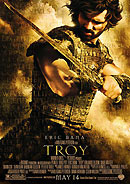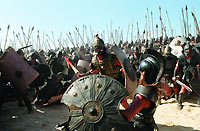 |
TROY
Reviewed by Lee Medcalf
Director: Wolfgang
Petersen
Starring: Brad
Pitt, Eric Bana, Orlando Bloom, Brian Cox, Peter O'Toole, Saffron Burrows
Extract from
Dictionary.com:
Epic (pro E-piK) -An
extended narrative poem in elevated or dignified language, celebrating the
feats of a legendary or traditional hero.
Extract from Unspoken
Hollywood Rulebook:
Epic
(pro E-piK) - An
overblown CGI battle sequence or sequences, slow-motion close-ups on
leads, music traditionally by Hans Zimmer, minimal plot.
 Of
all the literary epics - in the truest sense of the word - Homer's The
Iliad has to rate as one of the all time greats. Anyone who's
immediately trying to remember which episode of The Simpsons I'm
talking about should leave now. Of
all the literary epics - in the truest sense of the word - Homer's The
Iliad has to rate as one of the all time greats. Anyone who's
immediately trying to remember which episode of The Simpsons I'm
talking about should leave now.
The story of the King of
Kings, Agememnon, and his lust for power, and of Trojan prince Paris and
his stealing of Agamemnons' brother's wife, Helen, and the war that ensues
from this event has long endured. Legendary heroes Achillies and Hector's
names still reverberate even to this day, some three thousand years after
the events they took part in.
So, surely in this day
and age of movie making, where grandiose glorious heroes, heroic feats and
huge, sweeping storylines are regularly being made and applauded, Wolfgang
Petersen's movie of The Illiad, Troy, should fill the gap
left by other epics like the Lord of the Rings trilogy.
The story, in case you're
not well-versed with Greek poetry, is that of Agamemnon (played with slimy
gusto by Brian Cox), the King of Kings, who ruled most of the kingdoms
surrounding the Aegean Sea some three thousand years ago. The keys to his
power were the huge armies of other kingdoms that he commanded, and the
legendary warrior Achillies (Brad Pitt), the greatest warrior who ever
lived. Achillies, though, is a warrior who's in it for the glory, not for
any particular allegiance, and he openly detests Agamemnon.
Agamemnon lusts after
power. The one empire that has yet to fall is the Trojan empire, protected
by the supposedly-impenetrable wall that surrounds the main city of Troy.
When Menelaus, Agamemnon's brother, has his wife, Helen, stolen away by
Trojan Prince Paris (Orlando Bloom), Agamemnon uses this event as an
excuse to wage war on Troy, while the Trojans, lead by warrior Hector
(Eric Bana), prepare for the impending onslaught.
This brief synopsis alone
is enough to tick every box under the heading Epic: Huge armies colliding?
Check! Noble heroes who will die for the love of a good woman? Check! Evil
conniving rulers who have no honour?. Check! Everything is, in a word,
BIG!
So... the fact that the
movie is insanely dull has to raise an eyebrow or two.
 The
director seems to know what will work on paper, but cannot seem to grasp
how to translate the words to screen. In theory,
having fifty thousand men on
either side colliding in a massive melee as the camera pans lovingly over
the immense action tableaux sounds like a shot that simply can't fail to
impress with its sheer breathtaking visual audacity, but when you see it
on screen you realise the difference between these moments in Troy
and similar moments in The Two Towers or The Last Samurai.
The difference is emotional depth. Both the previously mentioned films had
carefully crafted characters, with real reasons for being in the situation
that they found themselves in. These were heroes audience could empathise
and root for, but with Troy, every character, barring Eric Bana's
Hector, is wholly unsympathetic, and in most cases stupid as all hell. Of
course, you have to accept that the times in which the story takes place
gives most of the characters some leeway, especially when every second
line is an exclamation of "By the Gods!" or "The Gods favour us..." The
director seems to know what will work on paper, but cannot seem to grasp
how to translate the words to screen. In theory,
having fifty thousand men on
either side colliding in a massive melee as the camera pans lovingly over
the immense action tableaux sounds like a shot that simply can't fail to
impress with its sheer breathtaking visual audacity, but when you see it
on screen you realise the difference between these moments in Troy
and similar moments in The Two Towers or The Last Samurai.
The difference is emotional depth. Both the previously mentioned films had
carefully crafted characters, with real reasons for being in the situation
that they found themselves in. These were heroes audience could empathise
and root for, but with Troy, every character, barring Eric Bana's
Hector, is wholly unsympathetic, and in most cases stupid as all hell. Of
course, you have to accept that the times in which the story takes place
gives most of the characters some leeway, especially when every second
line is an exclamation of "By the Gods!" or "The Gods favour us..."
Troy doesn't give
any background to the
characters. Instead of taking time to build emotional ties to the
characters, and giving the audience a basis to accept this kind of bluff
talk, Petersen seems to want to dive straight in with the CG war stuff,
and let the actors do what's required to flesh out any character
traits that the meagre script provides. This poison chalice serves Bana
well. He works really well as Hector, a man perhaps before his time, who
works on strategy, while the religious factions base battle plans on crows
flying overhead holding snakes, or any other omen they can deem from their
surroundings. Sadly his nemesis, Pitt's Achilles, has been devolved from
the Demigod force of nature in Homer's stories to a brainless lunk whose
only motive for anything is to have people recount his stories in a
thousand years time. Other characters, such as Sean Bean's Odysseus, who
could effortlessly command whole swathes of film time are poorly served by
a weak script and endless battle scenes. Orlando Bloom's Paris, who starts
the war in the first place, is a coward by nature. He, too, is underused,
except for a final dénouement, and by the time it arrives, you will find
yourself past caring.
 The
camerawork is clearly lavish, and tries very hard to make everything
epic, but again, like so much else in the film, it does what it says
on the tin, but feels remarkably soulless and manipulative. It gives each
and every one of the bronzed - and, in Diane Kruger's case, impossibly
beautiful - cast their soft focus slow motion moment in the sun to make
you realise just how heroic / legendary these characters are. The
camerawork is clearly lavish, and tries very hard to make everything
epic, but again, like so much else in the film, it does what it says
on the tin, but feels remarkably soulless and manipulative. It gives each
and every one of the bronzed - and, in Diane Kruger's case, impossibly
beautiful - cast their soft focus slow motion moment in the sun to make
you realise just how heroic / legendary these characters are.
Each time the movie
begins one of its many, many moments of conflict, it is filmed as a
glorious sweeping shot, but then quickly becomes confused, and gives you
no idea of exactly what is going on. This removes you from the action, and
leaves you waiting to see a face that you recognise in the fight to help
you intepret the battle.
And that is the crux of
the matter. For all the CG battle glory, Troy fails to engage on
every level. I continually bring up the CG battles, but the reason for
this is simple: they make up the majority of the film.... Greeks arrive,
fight Trojans, Trojans fall back, Trojans fight back, Greeks fall back,
Greeks fight back, Trojans fall back, etc, etc, etc ad nauseam. The
battles are so huge in both running time and scale that a number of
unintentional laughs are caused by the situations, such as a single
warrior being killed by Hector, who suddenly calls the battle off with the
whispered line "enough killing for one day", which would work if the army
was the twenty men surrounding him at the time, but when you're aware that
the fight is stretched over ten miles of beach, with millions of men on
either side fighting, it becomes ridiculous.
As
mentioned before, you suddenly realise that the reason the battles in
The Two Towers worked was because
there was a well
crafted film
between the fights. By the end of Troy you honestly can't say the
same. After a similarly-epic running time of two hours and forty odd
minutes you would hope you could remember something other than just a
swarm of little men hitting a similar swarm of little men, but, alas, no.
Troy could have
been a fantastic film; a combination of Gladiator's sword and
sandals historical epic storytelling and Return of the King-style
battles, but in the end the only thing it leaves you with is a nagging
feeling that it all could have been so much better if it had not tried to
be epic, in any sense of the word, and just tried to be another word
beginning with e. Entertaining. |